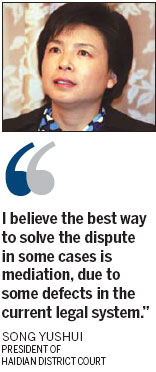Profile
Judge wields gavel with evenhandedness and empathy
By Yang Wanli (China Daily)
Updated: 2010-03-30 08:13
 |
Large Medium Small |
With her short, cropped hair and fair complexion, Song Yushui aims to always keep a smile. Her name, in Chinese, means water and fish. But make no mistake: Song's job is a serious one.

As president of the Haidian district court, Song, 43, has fought for justice over the past 16 years without any case complaints being lodged. She has handled nearly 2,000 cases, more than 300 of them complicated ones or involving emerging areas of law.
"She is a judge who perfectly used law to distinguish between right and wrong. Both losing and winning parties were persuaded by her reasonable analyses," a comment on her said on the website chinacourt.org. METRO interviewed Song to learn more about the spirit that encourages her to look forward.
METRO: Are the cases received in Haidian district court different from those in other districts or counties in Beijing?
Song: Different from other courts in the city, Haidian district court received more civil cases on contract disputes and intellectual property rights protection because of its location, which includes Zhongguancun, an area considered as China's Silicon Valley.
Our court received 1,625 cases related to intellectual property rights in the past year, an increase of nearly 20 percent over the previous year. Those cases were hard to handle because the market in China is still growing, as is the supervision system and the law.
METRO: How did you successfully handle those cases?
Song: By being patient and listening. Seeing the cases from two sides is my skill. I believe the best way to solve the dispute in some cases is mediation, due to some defects in the current legal system.
METRO: Would you like to share an example with us?
Song: I once received a case that impressed me a lot. A soft drink factory owed thousands of yuan to a primary school. I was ready to punish the boss at the very beginning. But after deep investigation, I decided to help him. I went to the factory in Guangzhou province and found that the boss was discreet in his behavior and his production run was high quality. Because of a mistake in materials selection for the bottle, he lost money.
His spirit to pursue business and his great determination really touched me. Through talking to him, I believed that he was a trustworthy businessman. Finally, I decided to negotiate with the plaintiff and gained further time for him to make the payment. I was moved that he paid all the money back before the deadline. That case made me believe in the importance of investigation.
METRO: Do you think kindness can destroy justice?
Song: I was proud of my work because there is a saying that judge is the one closest to a god. They (litigants) say I am a nice person. But I don't think it's a controversial thing, because law is guiding my kindness. Law will not be changed by emotion, but we can use it in a gentle way.
METRO: Were you influenced by your family and the education you received during your childhood?
Song: I was born in a village in Penglai, Shandong province. I was definitely influenced by the traditional culture there. I was taught to behave obediently and be tolerant when I was a child. As a woman, being nice to others has become a habit for me. Perhaps that's why I got used to taking others as a priority. This made me get used to consider living in other people's shoes.
METRO: Is there anything that you lost because of your job?
Song: I once felt unhappy and couldn't bear the burden of being a judge. I got tired of the overtime and not spending time with my family. My son is now in middle school and he is sensible and considerate to others. I felt sorry for him because I spent little time with him. He seldom has a chance to enjoy a meal I cook. We surely lose something in the pursuit of our dreams. But I still love my job, which gives me a chance to bring justice to everyone.







